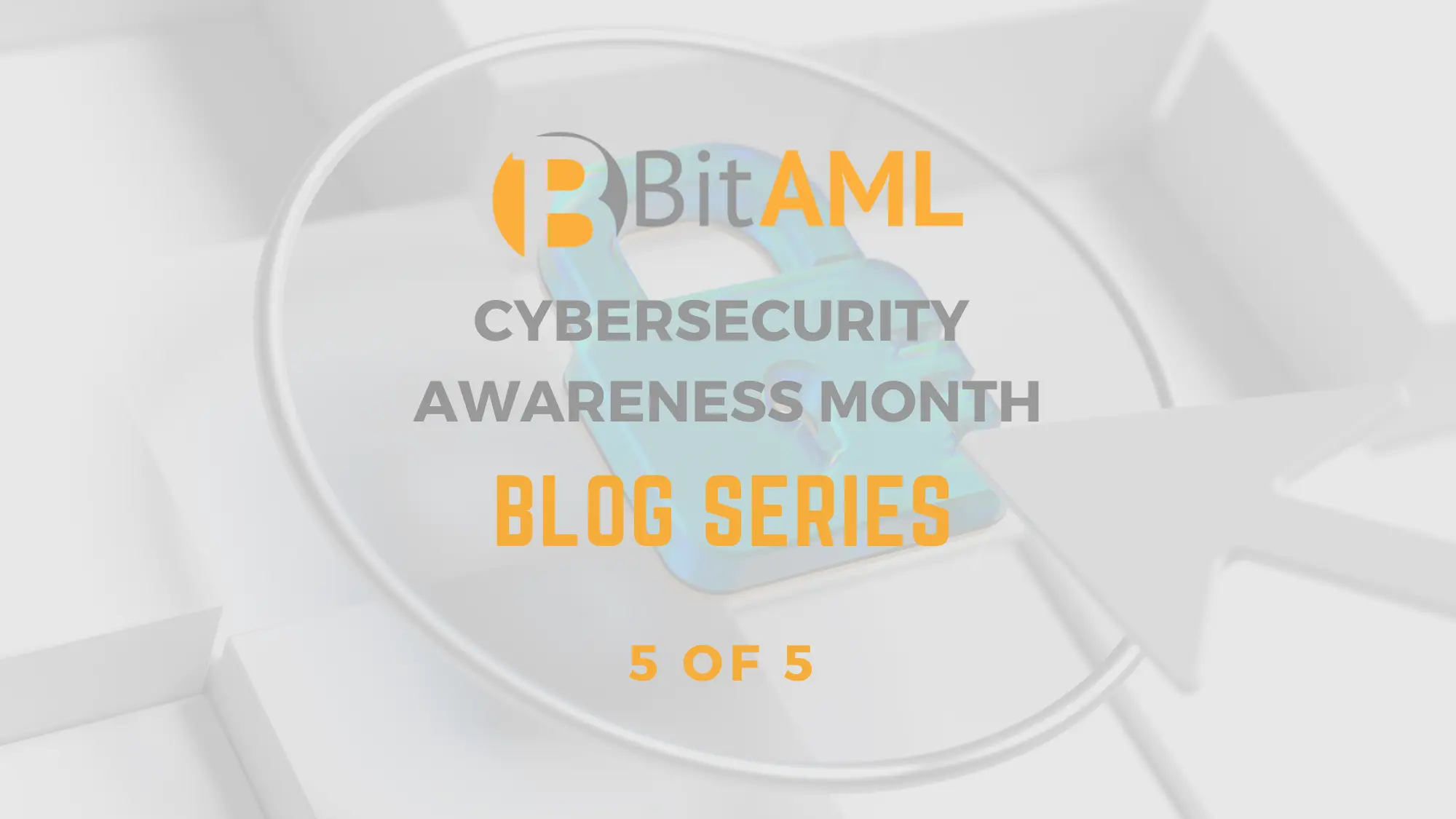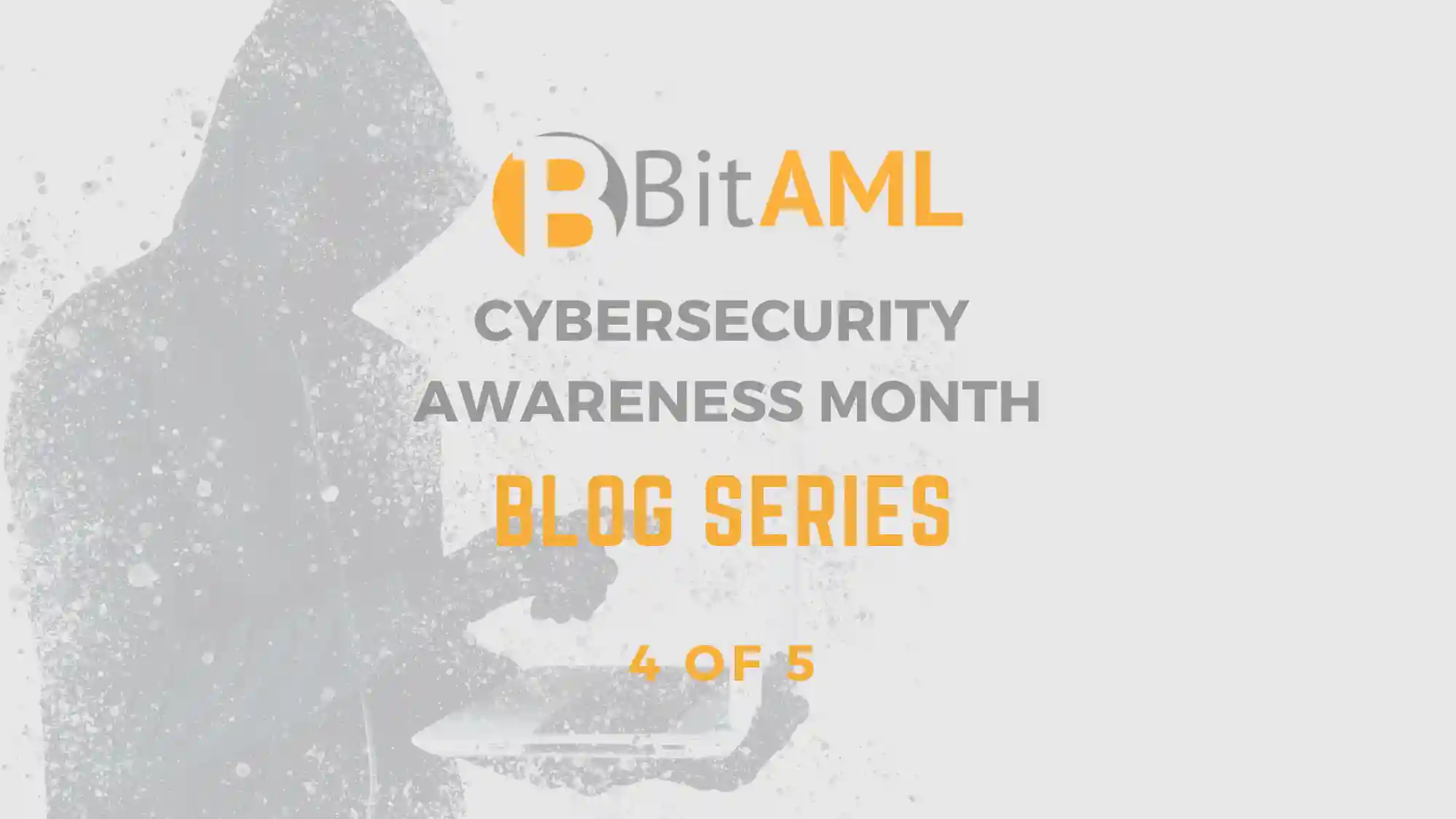October is Cybersecurity Awareness Month in the United States, and BitAML is committed to spreading knowledge and awareness about online security. Throughout this month, our blog posts will provide valuable insights, practical tips, and real-world perspectives to help individuals and organizations reduce online risks.
In an era defined by digital transformation, the paramount importance of cybersecurity has never been more evident. The increasing frequency and sophistication of cyber threats necessitates a robust and adaptable defense. We’ll take a deep dive into the multifaceted realm of cybersecurity regulations, policies, and procedures specifically tailored to the dynamic reality cryptocurrency companies live in. As regulatory expectations continue to evolve, understanding the distinct approaches taken by different states becomes imperative.
The Evolving Landscape of Cybersecurity Regulations
The digital age has ushered in a tidal wave of cyber threats that transcend boundaries. From ransomware attacks to data breaches, the implications of inadequate cybersecurity practices are vast. To safeguard sensitive information and bolster consumer trust, comprehensive cybersecurity policies and procedures are now indispensable. Yet, as the threat landscape continues to evolve, so too do the regulations that aim to mitigate these risks.
Understanding the Evolving Landscape of Cybersecurity Oversight
 Cryptocurrency’s rapid rise has introduced new dynamics and challenges to the financial world. With innovation comes a need for robust cybersecurity measures to safeguard against emerging threats. The U.S. Securities and Exchange Commission (SEC) recognizes this urgency and actively addresses cybersecurity concerns in the cryptocurrency sector. In this section, we delve into the SEC’s pivotal role in shaping cybersecurity regulations, focusing on its proactive stance in an ever-evolving digital landscape.
Cryptocurrency’s rapid rise has introduced new dynamics and challenges to the financial world. With innovation comes a need for robust cybersecurity measures to safeguard against emerging threats. The U.S. Securities and Exchange Commission (SEC) recognizes this urgency and actively addresses cybersecurity concerns in the cryptocurrency sector. In this section, we delve into the SEC’s pivotal role in shaping cybersecurity regulations, focusing on its proactive stance in an ever-evolving digital landscape.
As global markets expand and grow more intricate, so do the risks of cyber threats, including intrusions, service disruptions, manipulations, and insider misuse. In the United States, cybersecurity oversight spans multiple government agencies, with the SEC playing a key role. Yet, the onus of cybersecurity responsibility extends to all market participants. The SEC collaborates with various stakeholders, closely monitoring cyber threat developments to ensure effective responses that protect the financial sector’s integrity.
Read the SEC’s comprehensive guidance on cybersecurity here.
States at the Forefront of Cybersecurity Regulations
States have taken significant strides in fortifying their cybersecurity regulations to address the mounting challenges posed by cyber threats. Each state has its unique approach and priorities, contributing to the evolving landscape of cybersecurity regulations. Below, we explore examples from various states, shedding light on the diverse regulatory frameworks they have implemented.
New York’s Department of Financial Services (NYDFS) Cybersecurity Regulation
New York’s NYDFS Cybersecurity Regulation sets a robust precedent for financial institutions operating within the state. It mandates these institutions to establish and maintain cybersecurity programs designed to protect consumers’ sensitive data. The regulation imposes stringent requirements, including annual cybersecurity risk assessments, multi-factor authentication, and data encryption. This proactive approach not only safeguards consumer data but also bolsters the cybersecurity posture of financial institutions.
New York’s BitLicense
New York’s BitLicense framework specifically targets virtual currency businesses, recognizing the unique and nuanced cybersecurity challenges associated with cryptocurrencies. It imposes rigorous cybersecurity requirements, such as maintaining a cybersecurity program, conducting regular audits, and reporting cybersecurity incidents promptly. By regulating the cryptocurrency industry, New York aims to protect both consumers and the integrity of the financial marketplace.
Massachusetts’ 201 CMR 17.00: Standards for the Protection of Personal Information
Massachusetts has long been at the forefront of data protection regulations with 201 CMR 17.00. This regulation sets a high bar for the protection of personal information, encompassing not only the Commonwealth’s residents but anyone whose data is stored or transmitted through Massachusetts. It requires businesses to adopt comprehensive data security programs, including encryption, employee training, and regular security assessments. Massachusetts’ commitment to data protection has positioned it as a leader in safeguarding sensitive information.
Texas’ Texas Identity Theft Enforcement and Protection Act (TITEPA)
Texas takes a unique approach to combating identity theft through its TITEPA. This legislation focuses on preventing identity theft by imposing stringent requirements on the disposal of records containing personal information. It also outlines procedures for notifying individuals affected by a breach of sensitive data. Texas recognizes the critical need to prevent identity theft at its source, making TITEPA a crucial component of the state’s cybersecurity efforts.
Comparing Regulatory Approaches
While these states have taken commendable steps to fortify their cybersecurity regulations, it’s essential to recognize the overarching impact of these initiatives. They collectively contribute to raising the cybersecurity standards across the nation, fostering a culture of proactive data protection and threat mitigation. As businesses navigate this complex regulatory landscape, understanding the nuances of each state’s approach is vital for achieving compliance and fortifying cybersecurity measures.
Related article: How to prepare your business for a cybersecurity review
Challenges and Compliance Considerations
Compliance with cybersecurity regulations is a formidable task that often comes with a host of challenges. In this section, we explore the common obstacles faced by businesses as they endeavor to meet regulatory expectations. Proactive cybersecurity measures, coupled with well-defined policies and procedures, play a pivotal role in achieving compliance and securing sensitive data.
Future Trends in Cybersecurity Regulations
The ever-evolving landscape of cybersecurity is a testament to the persistent adaptability of malicious actors and their tactics. As states grapple with these growing challenges, it’s crucial to anticipate and address future trends in cybersecurity regulations. Here, we delve deeper into the potential shifts and developments that may shape the regulatory environment.
- Expansion of State-Level Regulations
While we’ve highlighted a few states at the forefront of cybersecurity regulations, more states are expected to join this proactive movement or enhance their existing frameworks. The increasing awareness of cyber threats and the need to protect both consumer data and critical infrastructure will likely lead to a broader adoption of state-level regulations. Companies operating in multiple states may face a patchwork of varying requirements, making compliance a more complex endeavor.
- Federal Legislation on the Horizon?
The emergence of state-specific regulations has prompted discussions about the need for unified federal legislation. Crafting federal cybersecurity laws would create a more cohesive regulatory landscape, streamlining compliance efforts for businesses that operate across state lines. However, the process of reaching a consensus on federal regulations has historically been quite arduous, involving extensive debates and considerations.
- Enhanced Consumer Data Protection
Consumer data protection will remain at the forefront of regulatory efforts. Cybersecurity regulations are likely to place even greater emphasis on safeguarding personal information from breaches. This includes stringent requirements for data encryption, secure storage, and rapid breach notification. Companies will need to invest in robust data protection measures to ensure compliance.
- Focus on IoT Security
The proliferation of Internet of Things (IoT) devices has introduced new vulnerabilities into the digital landscape. These devices, from smart thermostats to industrial sensors, often lack robust security features. Future regulations may extend regulator purview to cover IoT security standards, necessitating manufacturers to implement stringent security measures in their products.
- Emphasis on Threat Intelligence Sharing
In an era where cyber threats are borderless, regulations may encourage threat intelligence sharing among businesses and government agencies. By fostering a collaborative approach to cybersecurity, regulators aim to create a network effect, where the collective knowledge of cyber threats strengthens the defense against malicious actors.
- Evolving Role of Cryptocurrencies
Cryptocurrencies have disrupted traditional financial systems and attracted their fair share of cybercriminals. Future regulations may delve deeper into the cryptocurrency space, imposing more comprehensive cybersecurity requirements on virtual currency businesses. This includes measures to prevent fraud, money laundering, and the security of cryptocurrency wallets.
- Artificial Intelligence (AI) and Machine Learning (ML) Regulations
AI and ML technologies are increasingly being deployed in cybersecurity for threat detection and response. Future regulations may address the ethical and security considerations associated with AI and ML, ensuring that these technologies are used responsibly and securely.
- Enhanced Penalties for Non-Compliance
To incentivize businesses to take cybersecurity seriously, future regulations may introduce more severe penalties for non-compliance. These penalties could include hefty fines, reputational damage, and legal consequences. As the stakes rise, businesses will have a greater impetus to invest in cybersecurity measures and compliance efforts.
In navigating the complex and ever-changing landscape of cybersecurity regulations, businesses must remain agile and proactive. Staying informed about emerging trends and technologies is essential for adapting to regulatory shifts effectively. By anticipating these future trends, your organization can position itself as a cybersecurity leader and a responsible guardian of consumer data in the digital age.
The Final Word on Cybersecurity in the Crypto World
In a digital world brimming with opportunities and risks, cybersecurity regulations stand as the sentinels guarding against potential breaches. This blog underscores the enduring significance of these regulations in today’s landscape and reinforces the importance of compliance. To thrive in the digital currency realm, businesses must not only navigate the current regulatory landscape, but also stay vigilant for future developments.
As you commence your journey through the labyrinth of cybersecurity regulations, we encourage you to assess your existing policies and procedures. The assistance and consultation of cybersecurity experts can prove invaluable in navigating these complex regulatory waters. Stay informed, stay compliant, and protect your organization in an ever-evolving digital world.
Dedicated cybersecurity is pivotal in the cryptocurrency space. BitAML provides unrivaled expertise in crafting top-tier security consulting and compliance solutions tailored to cryptocurrency endeavors. Drawing from a vast understanding of cryptocurrency systems, our team is poised to elevate your security and compliance protocols. Contact us today to see how BitAML can redefine and enhance your cybersecurity and compliance framework.


